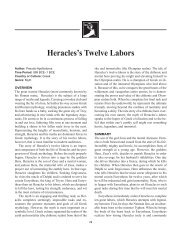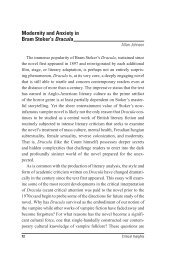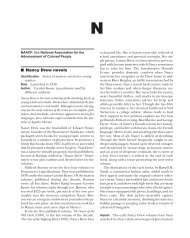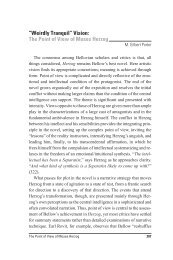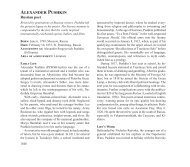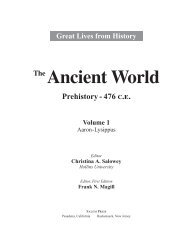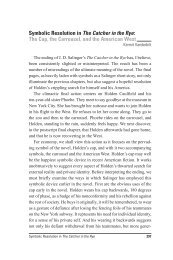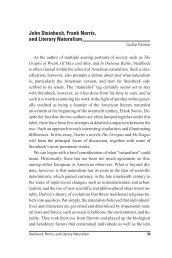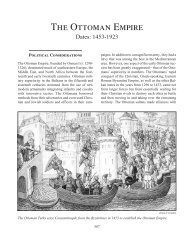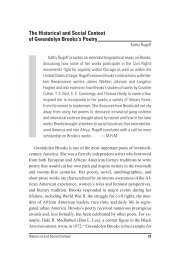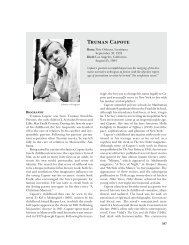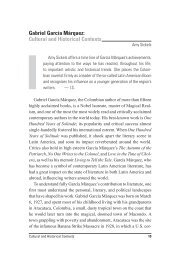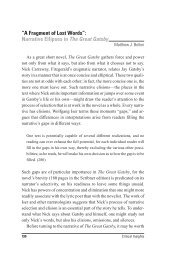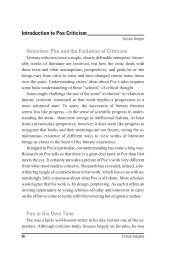You also want an ePaper? Increase the reach of your titles
YUMPU automatically turns print PDFs into web optimized ePapers that Google loves.
Critical Survey of Poetry <strong>Nash</strong>e, Thomas<br />
Strange News of the Intercepting of Certain Letters,<br />
1592 (prose and poetry; also known as The Four<br />
Letters Confuted)<br />
Summer’s Last Will and Testament, 1592 (play and<br />
poetry)<br />
The Unfortunate Traveller: Or, The Life of Jack Wilton,<br />
1594 (prose and poetry)<br />
The Choise of Valentines, 1899<br />
Other literary forms<br />
Almost all that Thomas <strong>Nash</strong>e wrote was published<br />
in pamphlet form. With the exception of a long poem<br />
(The Choise of Valentines), several sonnets and songs,<br />
and at least two dramas (Summer’s Last Will and Testament,<br />
pr. 1592, and The Isle of Dogs, pr. 1597), all of his<br />
work was prose. His prose works include The Anatomie<br />
of Absurditie (1589); An Almond for a Parrat (1590);<br />
a preface to Sir Philip Sidney’s Astrophel and Stella<br />
(1591); Pierce Peniless, His Supplication to the Divell;<br />
Strange News of the Intercepting of Certain Letters;<br />
Christ’s Tears over Jerusalem (1593); The Terrors of the<br />
Night (1594); The Unfortunate Traveller: Or, The Life of<br />
Jack Wilton; Have with You to Saffron-Walden (1596);<br />
and <strong>Nash</strong>e’s Lenten Stuffe (1599).<br />
Achievements<br />
Thomas <strong>Nash</strong>e was more a journalist than an artist, if<br />
the definition of artist is one who follows the Aristotelian<br />
principles of using life as a source from which one<br />
creates a story with a beginning, middle, and end. <strong>Nash</strong>e<br />
informed and entertained his sixteenth century audience<br />
in the same way that a journalist pleases the public today.<br />
He was known in his time not as a poet or a dramatist,<br />
although he wrote both poetry and plays. He was<br />
known as the worthy opponent of the scholar Gabriel<br />
Harvey, as one who with lively rhetoric, biting invective,<br />
and soaring wit destroyed every argument the pompous<br />
Harvey could muster. He was also known to Elizabethans<br />
as the chief defender of the Anglican Church<br />
against the attack of the Puritans in the Martin Marprelate<br />
controversy. The magnificent invective found in<br />
the speeches of William Shakespeare’s Falstaff, Prince<br />
Hal, and (more especially) Kent was almost certainly<br />
derived from the vituperation <strong>Nash</strong>e hurled at his adversaries.<br />
Among modern students of literature, <strong>Nash</strong>e is remembered<br />
for his most unusual work, the picaresque<br />
novel of adventure, The Unfortunate Traveller: Or, The<br />
Life of Jack Wilton. It is the story of a young page who,<br />
after serving in the army of Henry VIII, travels to Europe<br />
to find means of earning a living. The underworld<br />
realism that <strong>Nash</strong>e presents in his descriptions of Jack<br />
Wilton’s escapades has earned him a reputation for being<br />
something other than a hurler of invective. The book<br />
is not a unified work of art; its characters, other than<br />
Jack himself, are not particularly memorable. Its descriptions<br />
of the harshest elements of human life, such<br />
as disease, hunger, torture, rape, and murder, place it in<br />
stark contrast to the sweet absurdities of romance; it thus<br />
shows the way to the modern novel.<br />
Biography<br />
Thomas <strong>Nash</strong>e was born in November, 1567, the<br />
son of William <strong>Nash</strong>e, a minister in Lowestoft, Suffolk.<br />
Since no record exists of William’s being a university<br />
graduate, it can be assumed that he was probably<br />
a stipendiary curate in Lowestoft, not a vicar. Although<br />
the title pages of Pierce Peniless and of Strange News of<br />
the Intercepting of Certain Letters refer to “Thomas<br />
<strong>Nash</strong>e, Gentleman,” <strong>Nash</strong>e himself denied that he was<br />
of gentle birth. From his earliest years, indeed, he disliked<br />
the propensity he found in middle-class Englishmen<br />
to pretend to be something other than what they<br />
were.<br />
In 1573, <strong>Nash</strong>e’s father was granted the living in<br />
West Harling, Norfolk, where young Thomas probably<br />
spent his early years. Nothing is known of <strong>Nash</strong>e’s basic<br />
education except that it was sufficient to allow him<br />
to enter St. John’s College, Cambridge, in October,<br />
1582. In March, 1586, he received his bachelor of arts<br />
degree and enrolled immediately to work toward the<br />
master of arts degree. In 1588, however, he left Cambridge<br />
without the degree. Perhaps financial difficulties<br />
forced him to leave the university, for his father had<br />
died the year before, in 1587. Without financial support<br />
from home, <strong>Nash</strong>e likely would not have been able to<br />
continue his education; probably his college, dominated<br />
as it was by Puritans, would not look with favor in the<br />
form of financial assistance upon the satirical young<br />
<strong>Nash</strong>e, who supported the pursuit of humanistic studies<br />
2739



